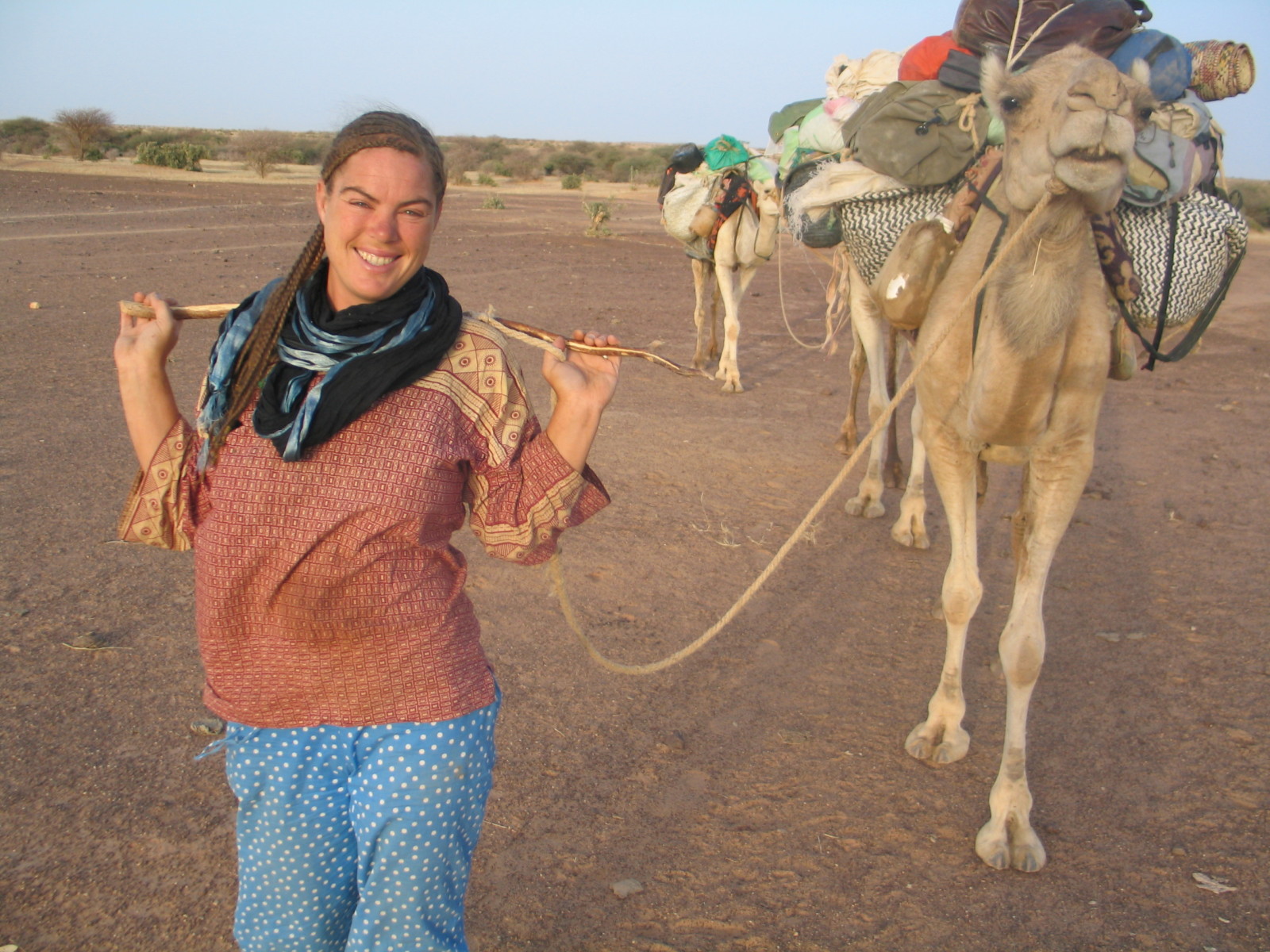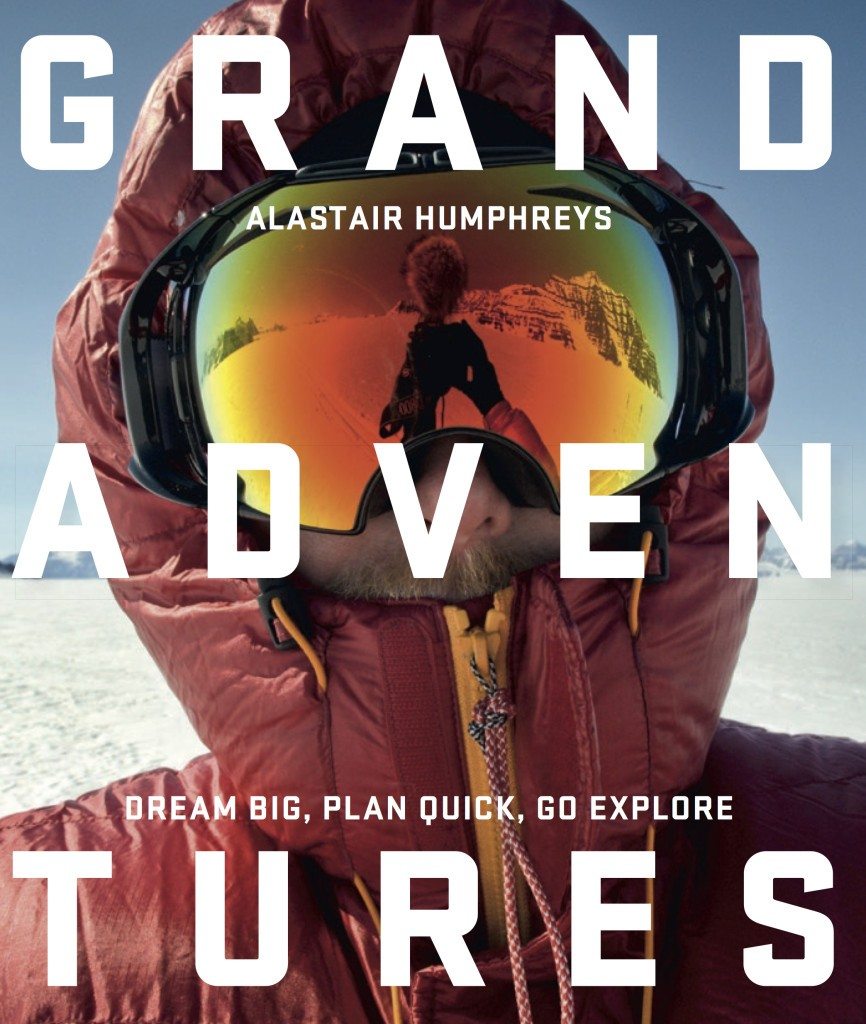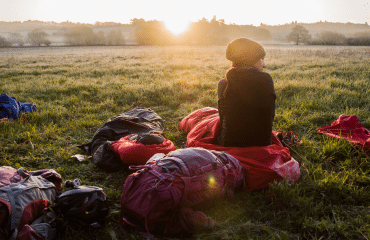Paula Constant spent 3 years walking from the UK to Africa and across the Sahara desert. She speaks eloquently and honestly about adventure. In other words, she’s worth listening to. I caught up with her, via Skype, at home in Australia.
Alastair: Can you give a brief summary of your first big trip?
Paula: The first big trip was the three-year walk. Walking from Trafalgar Square out and down through Europe. The first year was 5000 kilometres on foot with backpacks and then it moved into two years across the Sahara with camels. But that first year was definitely an adventure, poorly executed and a learning curve.[laughing] That began the whole thing.
Alastair: Why did you separate that answer into year one and the other two years. Does it feel to you like two different projects?
Paula: Yes, absolutely. Actually each of them feels very distinct, because of the nature of the Sahara. The first stretch, which was always going to be down to Southern Morocco was 5,000 kilometres. Oddly enough it ended up taking exactly a year to the day from when we set out. Which was kind of what we’d planned. I took a month off at that point and the same thing happened 12 months later – there needed to be another pause. So, it really was three distinct journeys, if you like.
Alastair: You set off as ‘we’. Who is we?
Paula: I was married when I left London. My husband and I left together. We walked the first year together. A month into the trip through the Sahara – I’md been married for eight years – our marriage broke up. Gary left the desert and I continued walking on my own.
Alastair: Wow. That is quite a big distinction between the two phases! Please tell me if you don’t want to answer these sorts of questions?
Paula: No, it’s fine.
Alastair: Okay. Because people keep asking me about this, trying to work out whether to do an adventure solo or with somebody else. I think you might have some good insight on this…
Paula: Look, I really believe there’s a place for both and I don’t have a fixed opinion at all, on whether one should do a trip with a romantic partner or not. I think it entirely depends upon the couple, the expedition, and everything. I think there are virtues to both. The first year, it meant the world to me to have a partner to walk with. And I’mm not sure to this day, whether or not I would have had the courage to leave on my own. I would like to think I would have. I probably would have, I think. But, nonetheless, it was a vital part of me being able to leave that I did have that support at the time. Having said that, I was absolutely and utterly frustrated by the time a year had gone past. And, I would say, travel certainly heightens any trouble with a couple. It heightened for me all of the things that were not right in the marriage anyway.
So, by the time the second year rode around, my patience was [laughing], at an all-time low. People always say travel sorts out whether or not a relationship is supposed to be. I’mm not entirely sure if I subscribe to that. But I think it was a hell of a load of pressure.
Alastair: Yeah, I agree.
People always say travel sorts out whether or not a relationship is supposed to be.
Paula: I don’t think it’s a fair litmus test in many ways. But, I think in my case, it was probably, it brought something to its inevitable conclusion. [laughing]
Alastair: Okay. [laughing] Right. The way you’re describing this, it seems to me as though the trip began mostly because it was something you wanted to do, rather than the two of you wanted to do. And something that I think is often an issue with trips is that when two people are planning something, there is always one person who wants it more. Was it a joint project or did you want it more?
Paula: At the time, if you had asked me, I would have told you wholeheartedly that it was a joint project. I thought it was what we both wanted. Probably what I didn’t see was that my ego and ambition at the time was driving me a certain way. I was probably a little bit short sighted in that respect. And you know, I’mve had years to reflect on that and should recognize that it was ultimately my drive, and to be fair I don’t know that my husband had much of a choice. I think it was a case of get on board or get off the bus.
Alastair: [laughing]
Paula: Even though I really thought that I was giving him lots of opportunities to opt out. I don’t know that genuinely I did.
Alastair: Okay, let’s leave it at that and move on! You just mentioned a word that really interests me: ‘ambition’. You said you were driven by ambition. That’s a huge part of myself that makes me get out of the front door and do stuff that seems scary. In what way did you see this as ambition? Because, you weren’t becoming a lawyer or getting rich or those sorts of ambitious things.
Paula: It’s been an interesting journey in the last few years to look back at what was driving me then and what drives me now, and how that differs. I’mm ambitious; I think that is never going to alter. But the way it manifests is interesting. At the time I was quite clear about what I wanted. I wanted to make a living doing something I loved. I wanted to write books and I wanted a big adventure. That was pretty much it. I didn’t want to be stuck in a 9-to-5 working for people I didn’t really respect. I had a strong desire to make my mark in some way. To live an extraordinary life, if you like. And for me that was what success meant: to succeed meant to lead an extraordinary life. So, that was my sole ambition, really.
I wanted to write books and I wanted a big adventure. That was pretty much it.
Alastair: And doing a three-year walk, which is extraordinary by anyone’s scale, did that scratch the itch for you in that aspect of ambition? Do you feel less need now to go out and prove yourself through those sorts of things?
Paula: I am so grateful for that walk. I can never describe. It’s taken me a long time to be grateful for it. But no, I wouldn’t say it scratched the itch. I loved it. I just loved it. Loved every step of it. But, I have learned that it’s okay to stop, to say “what do I want now?”. And to go in a totally different direction, which I’mve now done. But I wouldn’t say it scratched the itch. I’md say if anything it fired my brain synapses to really understand that anything that I can dream of is do-able. The important part for me is now is to be discerning about what I dream of.
The important part for me is now is to be discerning about what I dream of.
Alastair: I presume by that you mean that ambition is broader than just going off on epic adventures and expeditions?
Paula: I always knew that just doing adventure after adventure wasn’t my thing. It wasn’t what galvanized me. I had a really specific desire that was related to the Sahara. I was fascinated by the way that cultures and religions have moved across that part of the world and up into southern Europe. That was my big drive, wanting to see the world through those particular eyes and to walk the same pathways that various people I admired had taken. But the adventure for adventure’s sake never held any appeal to me.
Alastair: Where did your inspiration come from. You touched on the cultures out there – that really inspired you. But you also mentioned that you set out because you wanted to make a living as a writer. So, what inspired you? The culture that you were heading towards or the Ffyona Campbell prospects of getting paid to do a big trip?
Paula: No, I actually, I know Ffyona, and we get on pretty well. But at the time…
Alastair: You know her? I thought she just disappeared. I never met anyone who knows her. I would love to meet her.
Paula: She probably wouldn’t love to meet you, [laughing]
Alastair: [laughing] Why not?
Paula: She doesn’t really do publicity. Well she runs Wild Walks now. Well, she might you were into just interested in talking to her about Wild Food Walks, which she runs down in Devon.
Alastair: I loved her books.
Paula: So did I. Having said that, no, I wasn’t inspired by her. She walked for much different reasons to me. I had no interest in breaking records and I didn’t even really want sponsorship. That wasn’t what it was about for me. I was quite noble about it all [laughing].
Sorry, to answer your question, at the beginning it was straightforward: I was desperate to have time to write. But equally, I really felt like I needed to physically be moving. That was what I wanted. I wanted the physical experience of moving through countries and through people. I wanted to meet the people and understand other people. To see the world through other people’s eyes. That was my really only goal, I think at the time when I left.
Alastair: How have you found the process of going from a teacher – respectable, stable job for life and a pension – to the uncertainty of life since you jacked in that job and walked away from Trafalgar Square?
Paula: The leap off the cliff was a relief and one I never looked back from. I think that daily, because it put a barrier between me [and my past life]. It created a life for me, that I’mm grateful for. It made me a platform from which to spring board the rest of my life.
Alastair: That’s very cool. And why did you go on foot and not on a bike?
Paula: The idea of a bike never appealed to me. I’mll admit that deep down, Thesiger was my major inspiration. And he had done so much on foot. I was a total romantic. Still am, really. I think you have to be to some degree.
Alastair: Have you seen Leon and my incompetent desert film?
Paula: I loved it.
Alastair: Did you shake your head in despair at it?
Paula: No, not remotely. I loved the simplicity of it.
Alastair: You say, simplicity. But I love the idea of a journey with camels. But that seemed prohibitively complicated for me.
Paula: It was. But I didn’t realise it would be, when I set out. And because of that, it never seemed to be. There were a lot of times when I thought, “Oh my god, people just wouldn’t be able to do this.” [laughing] At the time it was a terribly ego-driven thought. But it was so peaceful on so many levels. Towns were a nightmare. Every month when I walked into a settlement it was always a shit fight, to be fair. But the second I got out of them, and I’md know I had another 30 days or whatever in front of me… it was just so beautiful and so peaceful and I loved every single second of that. There was not a day, not one dawn, not one night, that went by in the desert, outside of towns, where I didn’t think I was born to do this and I’mm so lucky to be here. Not one day.
Alastair: Wow, that would not be a bad epitaph to have…
Paula: Yeah.
Alastair: Okay, I’mve got three more questions. The first two of which, I think, will annoy you… One is about travelling on your own as a woman. You’re a delicate female thing, blushing in the desert…
Paula: [laughing]
Alastair: …so just give some advice that I can’t give to women who are thinking about adventure about the worries they have.
Paula: It’s an advantage would be the first thing I would say. In many many cultures around the world, it’s an advantage and don’t be afraid to be a woman. Don’t get me going on this. But one thing that many women do in adventure is that they try to compete with the boys. Well, we’re women. We travel differently. Embrace it. In most parts of the world, it works to your advantage to be not only a woman, but a beautiful woman, as feminine as you like. Don’t play on that. Don’t be a victim. But rather to stand in your magnificence, I would say. Nomadic cultures have nothing but the greatest of respect for strong women.
So, if you can remain smiling and gentle, but strong at the same time, you are at a distinct advantage to your male equivalent, who the local men will see as a threat. They’ll see you as something to be fascinated by. And that can usually be an advantage. Yes, occasionally you’re going to be sexually harassed, like every other day. But it all comes down to how you deal with that. And dealing with it, the biggest piece of advice I would give you is the same the world over. You’re polite and civil, but you’re much like a Jane Austen novel, with Mr. Collins, you know, you’re polite but firm. [laughing]
Alastair: [laughing]
Paula: And never take offense. Unless they’ve overstepped the mark. In which in no uncertain terms let them know that they’re out of bounds. They’re out of line.
Alastair: Did you notice a difference in the year you were travelling as a wife versus the year you were travelling as a solo woman?
Paula: Massive. I would say, as a woman, if you’re going to travel with a male partner, you need to be extremely clear between the two of you on where the boundaries are and what you expect of each other when you get hassled. Because it can be pretty awkward you know, coming from a equal society, and putting yourselves in that sort of environment. Where does he draw a line, where does he take offence – all that sort of things.
Alastair: Yeah, okay. I’mve spoken to quite a few women in this series. I talked to Shirine, she’s 20 years old, cycling around the world, very cool young woman. She was telling me about all the great experiences she has being a woman: things that you wouldn’t get to see as a man. It’s great.
Paula: Yep. I agree.
Alastair: The next boring question I’mve got the concerns that people have with travel that it’s dangerous. How did you feel about travelling, leaving safe old London and heading into the dangerous world?
Paula: The best way I can answer to that is that in every country I walked through, in every village, and this didn’t matter if it was France or Spain or Mauritania or Niger, in each village people would say, “Ah yeah, it’s a great village here. Everything’s good, but that next village… it’s really dodgy when you get there.” [laughing]
Alastair: [laughing] I’mve had exactly the same, yes!
Paula: [laughing] I mean it’s just so funny. The world over the people are the same. The world over you get the good, bad and the ugly. Walking’s fantastic, because it’s such an organic experience, that you sort of slip seamlessly from one place into the next. And you watch the landscape unravel.
Clearly I wouldn’t recommend somebody walking through Northern Africa right now, for example. As best as you can, you don’t take unnecessary risks, but danger is a much overrated thing. I think we spend too much time in fear. It’s not something that I have ever really given much thought to and still don’t. I recognise that some people are always going to be afraid and my belief is if you’re always going to be afraid, you’re probably best off not stepping out of the front door, because you tend to create what you feel.
Alastair: Thank you. If I gave you a £1000, what would you do?
Paula: Well, for a £1000 right now, what I would do is hire a set of cross country skates and head out to the Australian alps, this spring. I’md spend two weeks back country skiing with a pack, a tent, supplies and just head out amongst the spring snows. I’md just spend time under a spring sun and in the mountains. I’md love that.
Alastair: Cool. That’s a very good answer. Thank you.
You can read Paula’s books here.

My new book, Grand Adventures, is out now.
It’s designed to help you dream big, plan quick, then go explore.
The book contains interviews and expertise from around 100 adventurers, plus masses of great photos to get you excited.I would be extremely grateful if you bought a copy here today!
I would also be really thankful if you could share this link on social media with all your friends – http://goo.gl/rIyPHA. It honestly would help me far more than you realise.
Thank you so much!
Grand Adventures from Alastair Humphreys on Vimeo.




Hi Al, Hi Paula,
Great interview. My experience was the reverse – I met my ex-wife travelling and we split when trying to settle back into a routine. That set me off on my journey across the Sahara to Senegal where I’ve settled. I’ve also written a book that’ll be published by Eye in January 2015. Al – I’ll be back in the UK early next year so perhaps we can finally grab that coffee…or a beer?